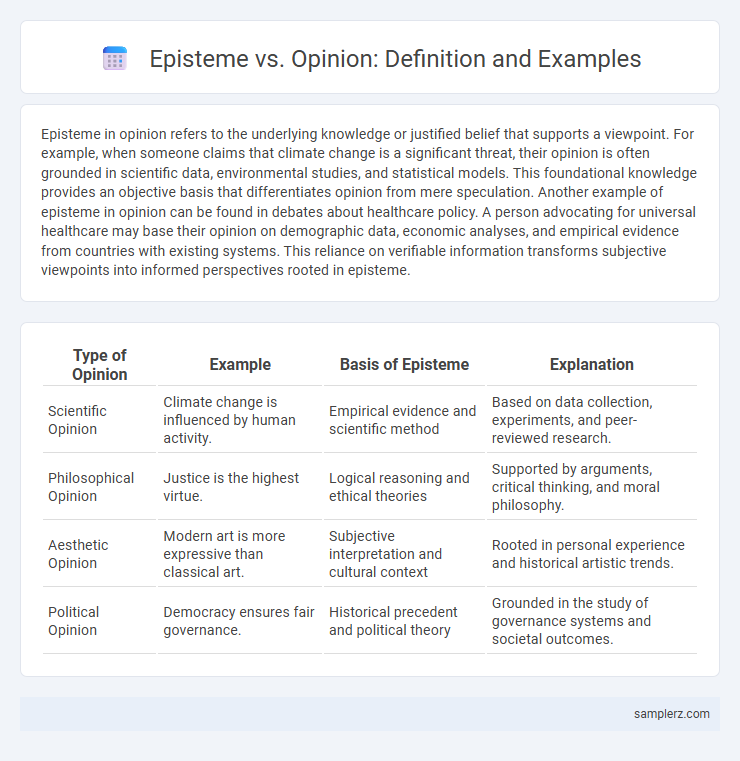Episteme in opinion refers to the underlying knowledge or justified belief that supports a viewpoint. For example, when someone claims that climate change is a significant threat, their opinion is often grounded in scientific data, environmental studies, and statistical models. This foundational knowledge provides an objective basis that differentiates opinion from mere speculation. Another example of episteme in opinion can be found in debates about healthcare policy. A person advocating for universal healthcare may base their opinion on demographic data, economic analyses, and empirical evidence from countries with existing systems. This reliance on verifiable information transforms subjective viewpoints into informed perspectives rooted in episteme.
Table of Comparison
| Type of Opinion | Example | Basis of Episteme | Explanation |
|---|---|---|---|
| Scientific Opinion | Climate change is influenced by human activity. | Empirical evidence and scientific method | Based on data collection, experiments, and peer-reviewed research. |
| Philosophical Opinion | Justice is the highest virtue. | Logical reasoning and ethical theories | Supported by arguments, critical thinking, and moral philosophy. |
| Aesthetic Opinion | Modern art is more expressive than classical art. | Subjective interpretation and cultural context | Rooted in personal experience and historical artistic trends. |
| Political Opinion | Democracy ensures fair governance. | Historical precedent and political theory | Grounded in the study of governance systems and societal outcomes. |
Understanding Episteme: Foundations in Opinion
Episteme in opinion refers to the foundational knowledge structures that shape how individuals formulate and justify their beliefs. It involves the critical examination of the principles, methods, and criteria that underpin the validity of opinions within specific domains of knowledge. Understanding episteme clarifies how opinions transform from subjective views into reasoned, evidence-based conclusions in fields such as philosophy, science, and ethics.
How Episteme Shapes Public Opinion
Episteme, as the foundation of knowledge systems, shapes public opinion by determining which information is considered valid and credible, influencing collective understanding. The reliance on scientific episteme during public health crises, for example, directs societal responses and policy acceptance. Public opinion solidifies when epistemic frameworks align with cultural values and accessible evidence, reinforcing shared beliefs.
Episteme vs. Doxa: Distinguishing Knowledge in Opinions
Episteme represents justified, universal knowledge grounded in evidence and reason, whereas doxa refers to opinion often based on belief or perception without rigorous validation. In distinguishing knowledge within opinions, episteme demands critical examination and objective criteria, contrasting with doxa's subjective and potentially fallible nature. Recognizing this distinction clarifies the reliability and epistemic value of claims made in public discourse or everyday reasoning.
Historical Examples of Episteme Influencing Societal Views
Historical examples of episteme, such as the Enlightenment's emphasis on reason and scientific inquiry, have profoundly shaped societal views on governance, human rights, and education. The shift from medieval scholasticism to empirical science transformed public opinion by prioritizing evidence over tradition. This epistemic transition underpinned the development of modern democratic ideals and the valorization of individual liberty.
The Role of Episteme in Contemporary Debates
Episteme shapes the foundation of contemporary debates by grounding opinions in systematic knowledge, enhancing the clarity and coherence of arguments. By relying on verified data and established methodologies, episteme distinguishes well-informed perspectives from mere speculation. This structured understanding elevates public discourse, fostering more constructive and rational debates in society.
Episteme in Media-Driven Opinions
Episteme in media-driven opinions is grounded in the systematic knowledge and credibility established by factual reporting, expert analysis, and evidence-based journalism. This form of epistemic rigor ensures that public opinions are shaped by verifiable information rather than misinformation or sensationalism. Media outlets that prioritize validation, source transparency, and data integrity reinforce the epistemic foundation behind widely accepted viewpoints.
Educational Episteme: Informing or Shaping Beliefs?
Educational episteme governs the systematic knowledge underlying teaching methods and curriculum design, shaping learners' beliefs through evidence-based frameworks. It prioritizes epistemic values like coherence, justification, and truth, influencing how information is presented and internalized. This foundation impacts students' cognitive structures, guiding their capacity to discern credible knowledge from opinion.
Authority and Episteme: Whose Opinion Counts?
Authority shapes episteme by determining whose knowledge is validated within society, often privileging experts in academia, science, or institutional leadership. Opinions from recognized authorities gain epistemic weight due to their verified expertise, rigorous methodologies, and established credibility. Debates on whose opinion counts hinge on the legitimacy of authority and its capacity to produce reliable, objective knowledge rather than subjective or anecdotal perspectives.
Episteme in Science-Based Opinions
Episteme in science-based opinions is rooted in systematic knowledge derived from empirical evidence and rigorous methodologies. This form of epistemic understanding emphasizes reproducibility, falsifiability, and peer-reviewed data to establish credible assertions. By relying on validated scientific principles, episteme ensures that opinions are grounded in objective reality rather than subjective belief.
Challenges of Integrating Episteme in Everyday Judgments
Integrating episteme, or scientific knowledge, into everyday judgments faces significant challenges due to cognitive biases and the complexity of expert information. Individuals often struggle to reconcile empirical evidence with personal beliefs or social influences, weakening the objective application of knowledge. This gap between episteme and opinion highlights the need for improved public literacy and critical thinking education.

example of episteme in opinion Infographic
 samplerz.com
samplerz.com